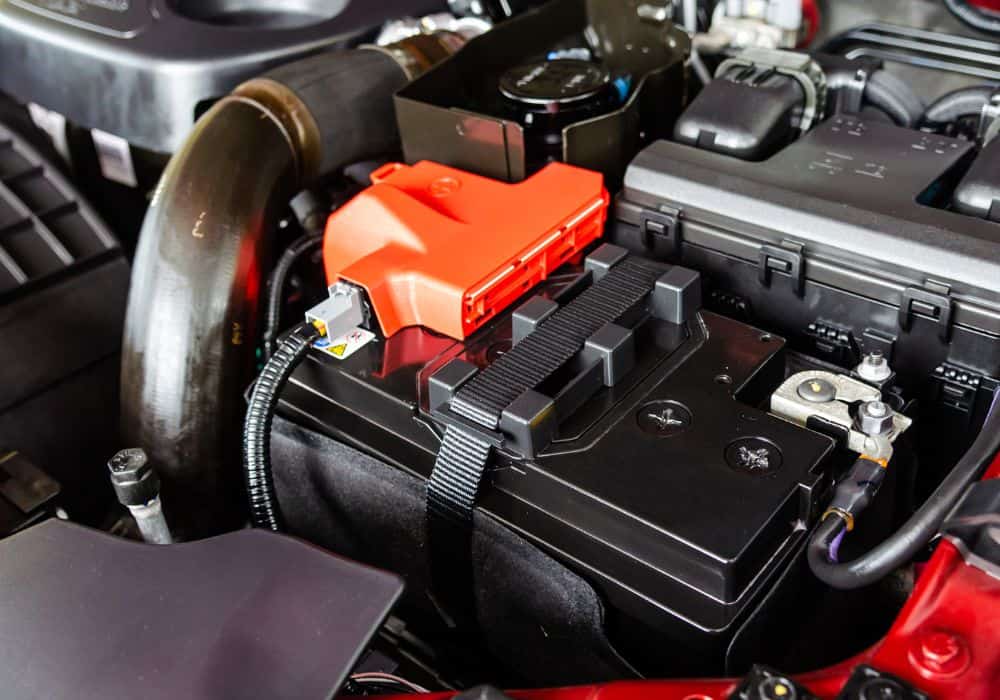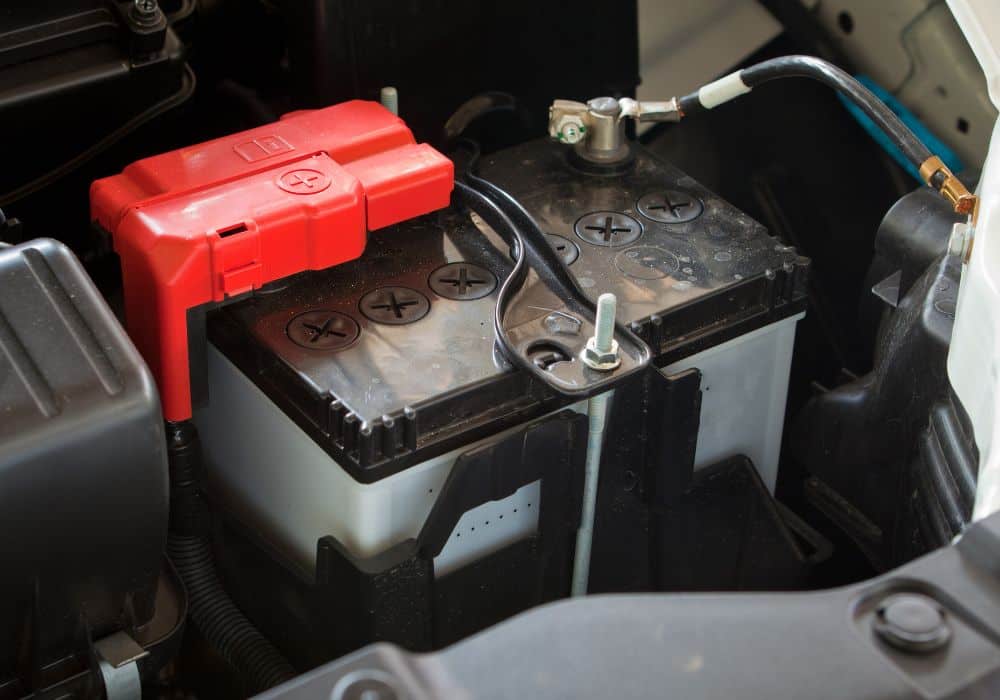When people take a look at batteries, they often want to find out all the little details, including the number of watt-hours they can expect in using it. This is also true for 12-Volt batteries, such as the car battery you might have in your vehicle.
Knowing wattages can help you figure out how soon you’ll need a new battery or whether you will have enough power to charge certain items. Did you ever wonder how many watts a typical 12-volt battery has? The answer isn’t so easy to determine…
Table of Contents
How many watts does a 12-volt battery have?
Unfortunately, it’s hard to give a distinct answer here. The number of watts your battery has is determined by the battery capacity, in amps. That number then has to be multiplied by 12 in order to get the full wattage.
For example, if your battery has a capacity of 100 ah, then the wattage would be 1200 watts. On the other hand, a 12-volt battery with a capacity of 50 amps would only have 600 watts.
To find out the wattage, check your capacity label on the battery. It’ll tell you how many amp-hours (or ah) your battery has.
Not good at math? No problem, you can find an online calculator that will tell you how many watt-hours your battery has.
How many watts does a typical 12-volt car battery have?
Though there are 12V batteries that have other usages, the most common reason to have a 12-volt battery is to power a vehicle like a car, truck, or RV. (It’s rare to see a 12-volt power an actual device unless you’re going off-grid in a motorhome.)
A typical 12-volt car battery has 4000 to 6000 watts, though some may have more due to a higher amp rating and better storage capacity. With that said, it’s safe to assume that your car battery has at least 4000 watts to use.
There are other types of 12V batteries out there, including marine battery rigs and deep-cycle battery chargers. Deep-cycle batters are good for low-draw, long-duration use, while marine batteries are a hybrid between the “starters” of car batteries and deep-cycles.
How many watts does it take to start a car?
The short answer here is that you need at least 1000 watts to get your car to start. However, there are certain factors that can increase the wattage you need to start your car:
- Outside temperature: You may have noticed that your car struggles with turning on when it’s cold outside. Hot temperatures help batteries work better, to point. If you want to start a car with ease, get a 12V battery with a high CCA rating.
- Car size: Larger vehicles like box trucks and SUV crossovers can require more wattage than small cars like a Mazda Miata. It’s just a bigger power draw.
- Engine age: If you have a vintage car, you might notice that it needs higher wattage to power. This is because those old motors have to work harder to just “wake up” from their slumber.
- Additional features: Your car will also need a battery.
- Appliances: Are you using this battery to power a new RV? If so, you may notice that your nominal voltage might not always be enough for a smooth start.
How can you tell how long an appliance can run?

Once you have calculated the wattage of your 12-volt battery, you can generally figure out how many hours you can run something. You can do this by dividing the wattage of the device you want to charge by the watt-hours of your battery.
For example, if you have a 1200-watt battery, a 1200-watt device will last about an hour when hooked up to the battery. If you just want to run a blender that takes 20 watts, then you can do it for 600 hours. (That’s a lot of smoothies!)
If you have a car, it’s important to remember that the battery only takes 1000 watts to start the car. That’s just a couple of seconds! The rest of the time, the car battery will use minimal wattage to power things like your radio, air conditioner, and lights.
What type of car battery lasts longer?
There are two main types of car batteries you can choose from: lead-acid car batteries, or lithium-ion batteries. While lead-acid batteries are more affordable, they don’t last as long as a lithium battery will.
If you can afford to do so, splurge on a lithium battery that has a high capacity. This will ensure that you get the most life out of your battery as possible.
How can you tell if you need a new 12V battery for your car?
Have you been noticing some car troubles as of late? It could be a battery issue that is causing the problems. Before you assume all is well with your batteries, watch for these warning signs below.
- You notice rust around the battery terminals. A rusty battery is a dangerous battery, no matter what the voltage may be. Corrosion can lead to explosions and fires.
- You see liquid or crystals leaking out of the battery. This is a classic sign of a lead-acid battery has been damaged. Throw it away in a safe manner, then get a new battery.
- Your battery doesn’t hold a charge anymore. Many batteries are now rechargeable, but only to a point. If you can no longer recharge the battery or if your disposable battery no longer holds a charge, it’s time to say goodbye.
- Your car used to sputter, but now it won’t even start. Does it feel like you’re turning your key into a pile of play dough? Were you already experiencing sputtering, only to end up with a car that won’t turn on at all? Get a jumper cable, turn on your car, and drive to an auto shop for a new car battery.
PRO TIP – Did you notice your battery leaking out stuff or dying early? This is why you need to make sure that you keep your car battery warranty in a folder with your other car documents. It will help ensure that you get that battery replaced as long as you have proof of purchase.
Important things to remember when getting a new car battery

If you want to have a car battery that will last and last, then you don’t just need to look at the amperage. It’s best to choose a battery from a manufacturer that has a good reputation and that offers a warranty of at least 3 years.
More importantly, you need to check out the RC rating. The RC rating stands for “reserve capacity,” and it measures how long the battery can run by itself. A high RC means that your battery will last longer and also provide more power.
If you live in a cold area, you also may need to check the CCA rating. This stands for Cold Cranking Amps. This rating shows the battery’s starting power, which has to match what your car’s starting power happens to be. It also shows how reliable your battery is in cold weather.
More expensive doesn’t always mean better. The same can be said of higher voltage batteries. When in doubt, look for a mechanic who can help you find the best battery for the electric load you want it to power. Too much of a good thing can be bad!
In conclusion
If you are looking for a battery with a high level of wattage, make sure to check the capacity rating. The higher the rating, the better your wattage will be and the more you will be able to power using the same 12 volts.
With that said, most car batteries are already designed for heavy use. You shouldn’t have to worry about being unable to start a car or being unable to power all the stuff in your RV. All it boils down to is choosing the right battery for the type of job needed.
Getting a new battery can be daunting, but you don’t have to do it alone. If you’re unsure of what you need, just ask. More often than not, getting help on the matter is the best thing that you can do for yourself and your vehicle.
